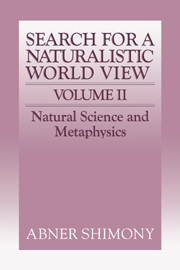Book contents
- Frontmatter
- Contents
- A MEASUREMENT IN QUANTUM MECHANICS
- B QUANTUM ENTANGLEMENT AND NONLOCALITY
- 7 Experimental test of local hidden-variable theories
- 8 An exposition of Bell's theorem
- 9 Contextual hidden variables theories and Bell's Inequalities
- 10 Controllable and uncontrollable non-locality
- 11 Events and processes in the quantum world
- 12 An exchange on local beables
- 13 Physical and philosophical issues in the Bohr–Einstein debate
- C COMPLEX SYSTEMS
- D TIME
- E THE MENTAL AND THE PHYSICAL
- Index
11 - Events and processes in the quantum world
Published online by Cambridge University Press: 05 June 2012
- Frontmatter
- Contents
- A MEASUREMENT IN QUANTUM MECHANICS
- B QUANTUM ENTANGLEMENT AND NONLOCALITY
- 7 Experimental test of local hidden-variable theories
- 8 An exposition of Bell's theorem
- 9 Contextual hidden variables theories and Bell's Inequalities
- 10 Controllable and uncontrollable non-locality
- 11 Events and processes in the quantum world
- 12 An exchange on local beables
- 13 Physical and philosophical issues in the Bohr–Einstein debate
- C COMPLEX SYSTEMS
- D TIME
- E THE MENTAL AND THE PHYSICAL
- Index
Summary
PROSPECTIVE
The concern of this paper will be different from that of most studies of quantum gravity. There will be no discussion of the problem of quantizing the gravitational field equations, hence nothing about the modifications which quantization requires of space-time structure at distances of the order of the Planck length (∼ 10−33 cm). The emphasis will be rather upon the implications of quantum mechanics for certain general properties of events and processes which occur in the theatre of space-time, specifically with non-locality and nonlinearity.
Quantum mechanics is undoubtedly a non-local theory when it treats correlated spatially separated systems. When one examines closely the character of this non-locality, however, one does not find reasons for modifying the causal structure of space-time as described by special or general relativity theory, but rather reasons for refining the concept of an event. The occurrence of definite outcomes of measurements implies that there are processes in nature governed by nonlinear laws. Nonlinearity is very peculiar from the standpoint of quantum mechanics, since it is contrary to the linearity of the time-dependent Schrödinger equation, which is commonly assumed to govern the dynamics of any isolated physical system. Hence it is necessary to inquire whether a rational treatment of the occurrence of outcomes is possible without some modifications of current quantum mechanics. Whatever decision is reached on this question, however, it does not appear to bear directly on space-time structure, but rather on the general character of processes.
Information
- Type
- Chapter
- Information
- The Search for a Naturalistic World View , pp. 140 - 162Publisher: Cambridge University PressPrint publication year: 1993
Accessibility standard: Unknown
Why this information is here
This section outlines the accessibility features of this content - including support for screen readers, full keyboard navigation and high-contrast display options. This may not be relevant for you.Accessibility Information
- 4
- Cited by
